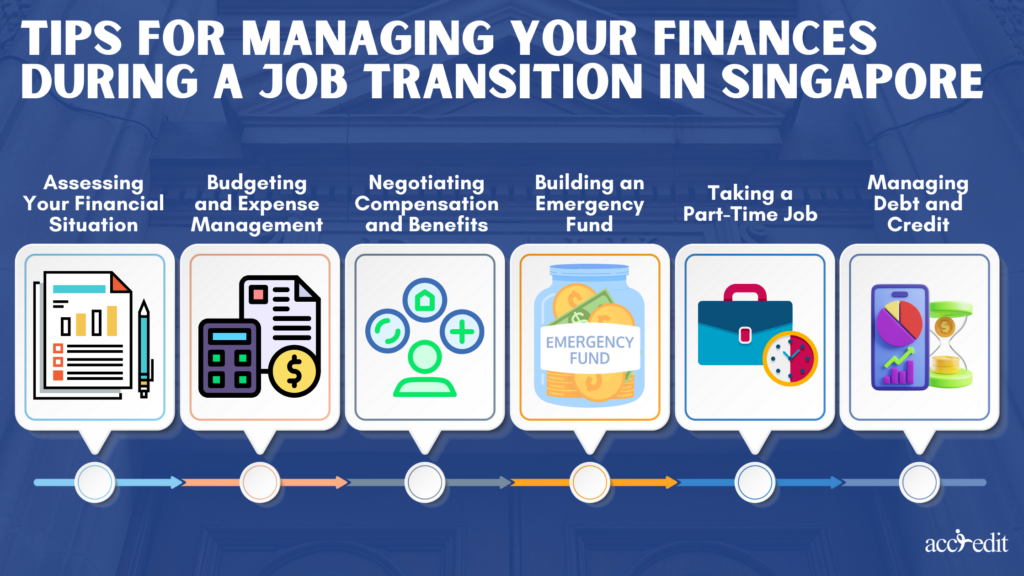
Ready to shake things up? Fed up with a job that’s leading nowhere fast? Craving a chance to spread your wings, conquer new challenges, and chase your dreams? Well, a career change could be just the ticket you need. It’s a thrilling moment, bursting with possibilities.
But to make the leap without a hitch, you need to handle your finances with finesse. In this article, we’ve gathered some practical pointers and savvy strategies to help you deftly manage your money while transitioning jobs in Singapore. So, let’s dive right in!

1. Assessing Your Financial Situation

Alright, let’s talk cold hard cash. Before you dive headfirst into a career change, you’ve gotta get real about where you stand financially. Take a good, long stare at your income, expenses, and what’s left in your savings account. Understanding your money situation is like building a sturdy foundation for the road ahead.
Now, imagine this: you’re a typical Singaporean with dreams of switching careers. You sit down at your dining table, armed with your bank statements and a steaming cup of kopi, ready to crunch some numbers. You’re not just looking at the dollars and cents, but also the changes that might come your way when you make that switch.
Think about what you want to achieve financially. Is it saving up for that dream investment? Tackling those nagging debts? Or maybe, setting aside some moolah for a rainy day? Whatever it is, get clear on your goals and priorities. It’s time to paint a picture of your financial future.
2. Budgeting and Expense Management

When it comes to managing your finances during a job switch, nailing down a solid budget is key. Let’s break it down step by step, so you can take charge of your expenses without breaking a sweat. First off, jot down all your must-pay bills like rent, utilities, groceries, and getting around town. Once you’ve got that covered, it’s time to find little pockets where you can save some cash without compromising your well-being.
Picture this: you could temporarily dial down on eating out or splurging on entertainment. Then, get savvy with your spending by meal prepping, hopping on public transport, or enjoying free activities around Singapore. Remember, it’s all about embracing the frugal lifestyle and putting your hard-earned money where it truly counts.
3. Negotiating Compensation and Benefits

When you’re switching jobs, it’s crucial to find out the typical salary range for the kind of work you want to do or the industry you’re interested in here in Singapore. Once armed with this knowledge, you’ll be in a better position to have a fruitful negotiation about your pay.
It’s important to present strong arguments that highlight your skills, experience and the value you can bring to the organization. Be confident and assertive when discussing your salary, with the aim of securing a fair and competitive package.
In addition to your paycheck, don’t forget to consider the other perks and benefits offered by potential employers. These could include things like health insurance, retirement plans, flexible work arrangements, or even opportunities for professional growth.
Take the time to evaluate the overall value of these benefits and see how they align with your long-term goals. By negotiating a well-rounded compensation package, you’ll be setting yourself up for financial stability during your career transition.
4. Building an Emergency Fund

Imagine this: you’ve just switched jobs, and with it comes a whirlwind of uncertainties. One of them is the possibility of a gap in your income. To tackle this head-on, it’s crucial to establish an emergency fund—a financial safety net that catches you when you fall. This fund is your ticket to peace of mind during unforeseen challenges.
Start by figuring out how much you’ll need to cover your essential expenses for the next three to six months. This calculation sets the foundation for your emergency fund. Picture it as a soft cushion that cushions you from financial stress.
Next, make it a habit to set up automatic transfers from your salary to a separate savings account. Treat it as a fixed expense that you can’t negotiate. By contributing regularly, you’ll steadily grow your emergency fund without even realizing it.
And here’s an interesting twist: you might want to consider opening a high-yield savings account or exploring investment opportunities to make the most of your emergency fund’s growth potential. This way, your money works harder for you, ensuring a stronger safety net in times of need.
5. Taking a Part-Time Job
Picture this situation: you’re going through a transition in your career, and you find yourself in need of some additional funds to cover your expenses. No need to worry! A part-time job could be the perfect solution you’ve been seeking. It’s like a bridge that fills the financial gap while you navigate your career change.
Now, let me tell you the inside scoop. Instead of settling for just any regular part-time job, why not explore opportunities that align with your dream industry? By doing so, you not only earn some extra money but also stay connected to the professional world. And guess what? If you’re a freelancer, you can utilize your skills and expertise to discover part-time gigs that complement your unique talents.
For example, let’s say you have a passion for graphic design. Rather than taking on a mundane part-time position, you could seek out freelance projects that involve creating stunning visuals for clients. This way, not only do you earn some extra cash, but you also get to enhance your portfolio and network within the design industry.
6. Managing Debt and Credit
When you’re switching jobs, it’s vital to handle your existing debts wisely. Picture this: you’re a Singaporean making a career move, but you’ve got some lingering debts hanging around. So, how do you deal with them?
First things first, prioritize which debts to tackle based on their interest rates and how they affect your finances. Start by taking down the high-interest ones to keep the overall cost as low as possible. If necessary, you can even explore options like consolidating your debts or having a chat with your creditors to negotiate better terms.
Now, let’s talk credit cards. While you’re managing your debts, be mindful of how you use your plastic. Aim to settle your credit card bills in full and on time, so you don’t end up with pesky interest charges.
Remember, a healthy credit score is important because it can impact your future financial opportunities. Keep an eye on your credit utilization ratio, which is the amount of credit you’re using compared to your total limit. And unless it’s absolutely necessary, try not to take on new debts.
Thoughts
When it comes to navigating your finances during a job change in Singapore, it’s crucial to approach it with strategic thinking and a proactive mindset. Take a moment to evaluate your financial standing, craft a practical budget, and skillfully negotiate your compensation and perks. Additionally, it’s wise to establish an emergency fund, handle any debts responsibly, and consider part-time job options.
By embracing this transformative phase of your career with confidence, you can rest assured knowing that you have taken charge of your financial situation and established a solid groundwork for future success. Keep in mind that a well-managed financial transition sets the stage for a gratifying professional journey and a brighter financial future.
Empowering Your Career Transition: Discovering Financial Support with Accredit Moneylender
Are you feeling trapped in a never-ending cycle of monotony, where progress feels stagnant and stress becomes your unwelcome sidekick? Perhaps it’s time to consider shaking things up with a career switcheroo. Embarking on a new professional path can be a bold move, but sometimes, it’s worth taking the plunge. However, before you make any hasty decisions, it’s important to pause and carefully consider the potential outcomes.
Now, if you’re finding yourself short on cash as you venture into uncharted professional territories, worry not. You have the option to seek support from a reliable licensed moneylender. Accredit Moneylender is here to lend a helping hand with personal loans designed specifically to assist individuals in overcoming challenging situations.
With these personal loans, you can quickly access the funds you need, using them for personal expenses as you navigate the job market, which can often extend for months. So, don’t let financial constraints hold you back from pursuing your dreams. Take the leap forward with a little boost from Accredit Moneylender.

